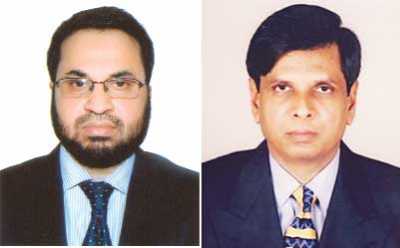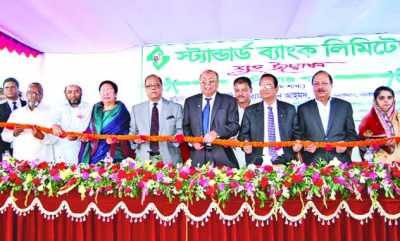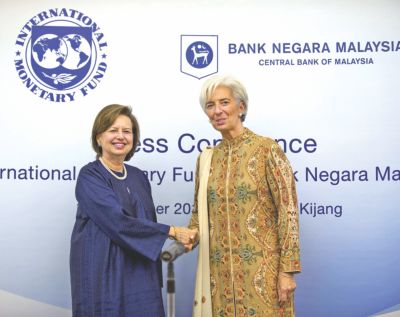Banking
Anisul Haque made SIBL Chairman
 Anisul Haque - Rabban Ali
Anisul Haque - Rabban Ali
Md Anisul Haque was elected chairman of Social Islami Bank Limited (SIBL).
Besides, Alhaj Sk. Mohammad Rabban Ali and Md. Sayedur Rahman were elected vice-chairmen of the bank.
The election was held at the 277th meeting of the board of directors of the bank in Dhaka Tuesday, said a press release.
Md Anisul Haque, a director (Finance and Accounts) of Hamdard (Waqf) Bangladesh, is also a founder director of SIBL on behalf of Hamdard (Waqf) Bangladesh.
Besides doing business, he has been making remarkable contributions to various fields like social welfare, education, health and religious activities.
Al-haj Sk. Mohammad Rabban Ali is a leading businessman and industrialist of the country. He is the founder director of SIBL.
News: The Daily Sun/Bangladesh/15-Nov-12
Govt appoints 2 BB directors
The government has appointed four directors in three financial institutions including the Bangladesh Bank (BB), official sources said.
The Banking and Financial Institutions Division of the Finance Ministry Wednesday issued four separate circulars on appointment of the directors for the BB, the International Finance Investment and Commerce (IFIC) Bank and the Bangladesh House Building Finance Corporation (BHBFC).
As per the circulars, the newly-appointed Banking Secretary M Aslam Alam, and Chairman of the National Board of Revenue (NBR) and Secretary of Internal Resource Division Md Ghulam Hussain have been appointed directors of the BB.
M Aslam Alam will replace Shafiqur Rahman Patwari and Md Ghulam Hussain will replace Nasiruddin Ahmed.
Additional Secretary of Finance Division Jalal Ahmed has been appointed government director of IFIC Bank and Additional Secretary of the division Shudhangshu Shekhar Biswas as director of BHBFC.
News: The Daily Sun/Bangladesh/15-Nov-12
Standard Bank opens branch in Gaibandha
 Kazi Akramuddin Ahmed, Chairman of Standard Bank Limited, inaugurates the 74th branch of the bank at Shila Plaza, at Gobindagonj in Gaibandha recently.
Kazi Akramuddin Ahmed, Chairman of Standard Bank Limited, inaugurates the 74th branch of the bank at Shila Plaza, at Gobindagonj in Gaibandha recently.
Standard Bank Limited opened its 74th branch at Shila Plaza, at Gobindagonj in Gaiban-dha.
Kazi Akramuddin Ahmed, Chairman of the bank inaugurated the branch as chief guest.
Mohammed Abdul Aziz, Director of the bank attended the ceremony as special guest, said a press release Wednesday.
SA Farooqui, Managing Director of the bank presided over the function.
Md. Abdul Wahed, Monowara Hakim Ali, AKM Shaheed. Reza, Md. Rezaul Karim Reznu, Bijoy Kumar Kejriwal, Md. Jalaluddin Ahmed Yeamin, Md. Aminul Hoque Shamim, were present among others.
News: The Daily Sun/Bangladesh/15-Nov-12
Bank loans being diverted Funds are spent for unintended purposes due to lax monitoring: ex-BB governors
A portion of bank credit is being used for unintended purposes due to weak monitoring by the regulator and the banks, two former central bank governors and a business leader said yesterday.
The central bank will have to earn autonomy by running the banking industry effectively, they said.
Former governors -- Mohammed Farashuddin and Salehuddin Ahmed -- and President of the Federation of Bangladesh Chambers of Commerce and Industry AK Azad made the observation at a discussion on the situation in the banking sector and macroeconomic challenges.
The Economic Reporters' Forum (ERF) organised the programme at the National Press Club in Dhaka with its President Khawaja Main Uddin in the chair.
“Credit has to be ensured for productive sectors, including small and medium enterprises,” Salehuddin said.
Ahmed said he carried out a research on 18 bank branches recently and found that the banks did not know where the credit was going.
The private sector credit witnessed 19.9 percent growth in the first quarter (July-September) of the current fiscal year against a monetary policy target at 16 percent, according to Bangladesh Bank data.
“Loans are not going to the targeted areas, if so, the economic growth would have been higher,” said AK Azad, who is a leading apparel exporter and a director of a private commercial bank.
“Banks are crazy for profits, they don't see quality always,” said Azad.
Farashuddin questioned if there is such a high growth in credit, why did the private sector investment go down by 1 percentage point last fiscal year?
Hassan Zaman, the chief economist of Bangladesh Bank, said they are working to find where the credit is going.
“The quality of credit growth matters,” Zaman said.
“We're trying to reduce the loan concentration among some big borrowers,” he said.
There was also a debate between the former and present officials of the central bank on the private sector credit growth The FBCCI president fuelled the debate, saying the private sector's credit growth should increase to 25-30 percent to help entrepreneurs create more jobs.
The chief economist of the BB said more credit will fuel inflation to double digit levels that will affect the poor.
He also said the credit growth in India is at 15 percent, which is nearly 20 percent in Bangladesh.
Former governor Ahmed said, “We should not mix up the credit growth of Bangladesh and India; they are different.”
He said India has a very big equity market and companies raise funds from the stockmarket before going for bank loans, but Bangladeshi companies prefer credit from banks.
On the central bank's autonomy, Deputy Governor SK Sur Chowdhury said the BB has the functional autonomy except for giving the employee benefits that are in the government's hands.
News: The Daily Star/Bangladesh/15-Nov-12
Lagarde wants 'real fix, not quick fix' on Greek debt
 International Monetary Fund Managing Director Christine Lagarde (R) shakes hand with Malaysian Central Bank Governor Zeti Akhtar Aziz in Kuala Lumpur yesterday.
International Monetary Fund Managing Director Christine Lagarde (R) shakes hand with Malaysian Central Bank Governor Zeti Akhtar Aziz in Kuala Lumpur yesterday.
The International Monetary Fund wants a "real fix, not a quick fix" on Greek debt, its managing director said Wednesday, days after publicly clashing with European officials on the issue.
Christine Lagarde also urged US legislators "at all costs" to avoid the "fiscal cliff" of spending cuts and tax rises that will come into effect January 1 unless the two parties can agree a deficit and debt reduction deal.
Asked at a press conference in Malaysia whether the IMF would insist on Greece's debtors taking a "haircut", Lagarde said all partners "share the same objectives and the same concern" to return the country to economic stability.
"And obviously from the IMF perspective we expect a real fix, not a quick fix, and that means clearly a debt that is sustainable as quickly as possible."
She declined to take further questions on Greece.
The country's debt crisis has revealed new strains between the IMF and European finance officials.
On Monday Eurogroup president Jean-Claude Juncker and Lagarde clashed openly on a key debt target in the bailout programme.
Speaking after a eurozone finance ministers' meeting in Brussels, Juncker said the country's debt target of 120 percent of gross domestic product should be put back two years to 2022. The current level is 170 percent.
Lagarde told the same press conference she believed the target should remain at 2020, the original date in the second bailout agreed earlier this year.
On China, the IMF chief said Wednesday the Communist Party congress that ended earlier in the day would clear uncertainties. The meeting has put in place a new top leadership line-up to be formally announced Thursday.
Economic actors "should be able to move in a more settled, certain environment. That is very important," she said.
"Our sense is that China is going to continue to be a significant driver for growth... China is a very important member of the IMF."
In a later speech on Asia's prospects, the IMF chief said the continent's response to its 1998 economic crisis has lessons for the rest of the world.
Asia's economic foundations "became safer, sounder, and more resilient -- but still open to the world and open for business. This has important lessons for the advanced economies currently facing severe challenges," she said.
"Of immediate concern, American policymakers must avoid the so-called 'fiscal cliff' at all costs," Lagarde said.
Otherwise, US growth would fall to zero or below "and the rest of the world will not be immune. This policy uncertainty must be resolved, and it will require all sides coming together."
Lagarde said the eurozone "must also deliver on its policy commitments at the national and regional level -- fiscal, financial, structural. And again, all players must play their part."
A major priority was a true banking union to complement its monetary union, she said.
"As a first step, this means a single supervisory framework; and ultimately, there also needs to be a pan-European deposit guarantee scheme and a bank resolution mechanism with common backstops."
News: The Daily Star/Bangladesh/15-Nov-12



